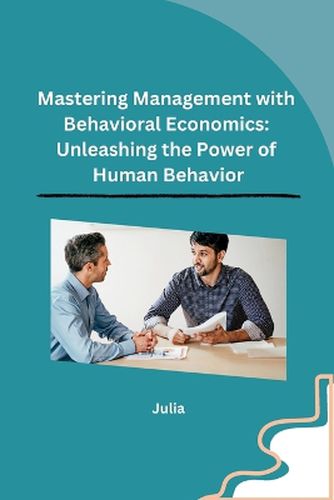Readings Newsletter
Become a Readings Member to make your shopping experience even easier.
Sign in or sign up for free!
You’re not far away from qualifying for FREE standard shipping within Australia
You’ve qualified for FREE standard shipping within Australia
The cart is loading…






This title is printed to order. This book may have been self-published. If so, we cannot guarantee the quality of the content. In the main most books will have gone through the editing process however some may not. We therefore suggest that you be aware of this before ordering this book. If in doubt check either the author or publisher’s details as we are unable to accept any returns unless they are faulty. Please contact us if you have any questions.
Behavioral Economics is a fascinating field that combines insights from psychology and economics to understand and predict human behavior in decision-making processes. It delves into the intricacies of why people make certain choices, often deviating from traditional economic theories that assume individuals are consistently rational and always act in their best interest.
This subchapter aims to provide an overview of Behavioral Economics, shedding light on its fundamental concepts and principles. Whether you are a student, a business professional, or simply curious about human behavior, understanding Behavioral Economics can offer valuable insights into how individuals and societies make decisions.
At its core, Behavioral Economics recognizes that humans are prone to biases, cognitive limitations, and emotions that influence their choices. It challenges the traditional economic assumption that individuals always act rationally by exploring the various factors that impact decision-making, such as social influences, heuristics, and framing effects.
By studying Behavioral Economics, you will gain a deeper understanding of why people often make seemingly irrational choices. For instance, why do we tend to overestimate our abilities? Why do we prefer avoiding losses rather than acquiring equivalent gains? These questions and more will be answered as we explore the fascinating world of behavioral economics.
Throughout this subchapter, we will delve into key theories and experiments that have shaped the field of Behavioral Economics. We will explore concepts like prospect theory, which explains how people evaluate and make decisions under uncertainty, and the endowment effect, which describes our tendency to value objects we own more than identical objects that we do not own.
Additionally, we will discuss the practical applications of Behavioral Economics in various domains, such as marketing, finance, and public policy. By understanding the underlying mechanisms that drive human behavior, you will be better equipped to design effective strategies, influence consumer choices, and drive positive change.
$9.00 standard shipping within Australia
FREE standard shipping within Australia for orders over $100.00
Express & International shipping calculated at checkout
This title is printed to order. This book may have been self-published. If so, we cannot guarantee the quality of the content. In the main most books will have gone through the editing process however some may not. We therefore suggest that you be aware of this before ordering this book. If in doubt check either the author or publisher’s details as we are unable to accept any returns unless they are faulty. Please contact us if you have any questions.
Behavioral Economics is a fascinating field that combines insights from psychology and economics to understand and predict human behavior in decision-making processes. It delves into the intricacies of why people make certain choices, often deviating from traditional economic theories that assume individuals are consistently rational and always act in their best interest.
This subchapter aims to provide an overview of Behavioral Economics, shedding light on its fundamental concepts and principles. Whether you are a student, a business professional, or simply curious about human behavior, understanding Behavioral Economics can offer valuable insights into how individuals and societies make decisions.
At its core, Behavioral Economics recognizes that humans are prone to biases, cognitive limitations, and emotions that influence their choices. It challenges the traditional economic assumption that individuals always act rationally by exploring the various factors that impact decision-making, such as social influences, heuristics, and framing effects.
By studying Behavioral Economics, you will gain a deeper understanding of why people often make seemingly irrational choices. For instance, why do we tend to overestimate our abilities? Why do we prefer avoiding losses rather than acquiring equivalent gains? These questions and more will be answered as we explore the fascinating world of behavioral economics.
Throughout this subchapter, we will delve into key theories and experiments that have shaped the field of Behavioral Economics. We will explore concepts like prospect theory, which explains how people evaluate and make decisions under uncertainty, and the endowment effect, which describes our tendency to value objects we own more than identical objects that we do not own.
Additionally, we will discuss the practical applications of Behavioral Economics in various domains, such as marketing, finance, and public policy. By understanding the underlying mechanisms that drive human behavior, you will be better equipped to design effective strategies, influence consumer choices, and drive positive change.